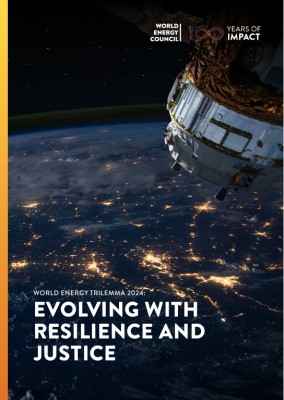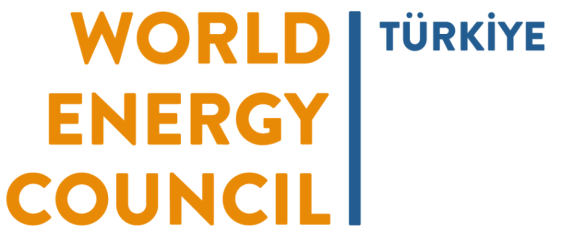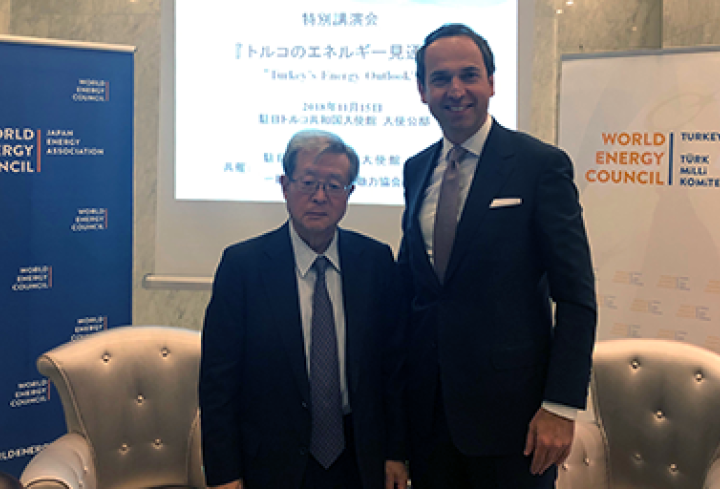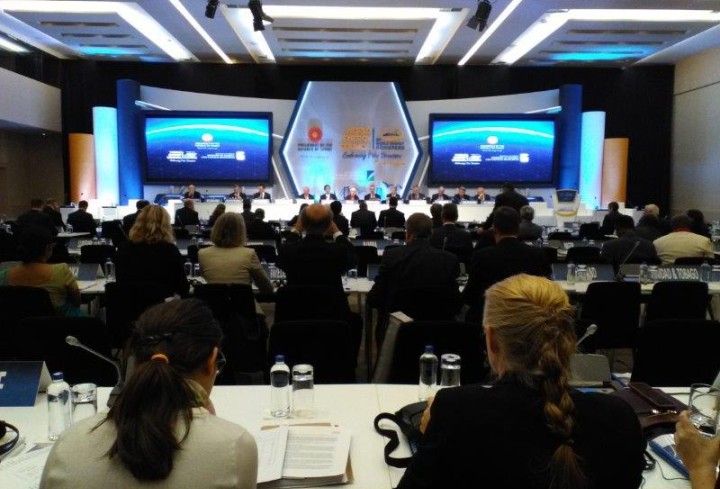The World Energy Council Türkiye Member Committee was founded in 1949 as an “organisation serving the public interest” and acts as a roof organisation for energy related NGOs operating in the country (www.dunyaenerji.org.tr). Presently, the Committee has a wide range of members from all energy related industries from public/private sector, energy associations to universities, experts, NGOs and private individuals. The committee’s main objective is to facilitate dialogue on domestic and global energy issues via various activities and events, as well as international projects, national reports and related publications (For more: @WEC_Turkiye).
The Committee hosted the 23rd World Energy Congress in October 2016. The Congress, under the theme of “Embracing new Frontiers”, was held in Istanbul with the participation of 4 Heads of State, 56 Ministers and more than 5.500 representatives from 151 countries including 266 speakers.
Alparslan Bayraktar serves as the Minister of Energy and Natural Resources of Türkiye. Prior to assuming this post, he was the Deputy Minister of Energy and Natural Resources between 2018-2023; the Deputy Undersecretary of MENR and the General Director of International Affairs and European Union between 2016-2018. Between 2010-2016, Mr. Bayraktar served as a Commissioner of Energy Market Regulatory Authority of Türkiye. Before his public service, he worked for the private sector in Türkiye and abroad.
Mr. Bayraktar also holds positions in various international organizations involved in issues relating to energy governance. He served as the Chairman of International Confederation of Energy Regulators (ICER) and Energy Regulators Regional Association (ERRA). Currently, he is the Chairman of World Energy Council Türkiye.
Mr. Bayraktar holds B.S. in Mechanical Engineering from Istanbul Technical University, LL.M. in Law and Economics from Bilkent University and M.A. in International Relations from Fletcher School of Law & Diplomacy at Tufts University. He received his Ph.D. in Energy, Environmental Economics & Policy from Middle East Technical University.’
Mehmet Ertürk was born in 1976 in Gaziantep. After completing his primary and secondary education there, he continued his education at Bilkent University Business Administration Department with a full scholarship in 1996. Having graduated in 2001, he began his professional career the same year as a Deputy Brand Expert. After working for about one year on this duty, Mr. Ertürk started working in EMRA as Deputy Energy Expert in January 2003 and was appointed as Energy Expert with a thesis on natural gas transmission schedules in 2006. Continuing his work on tariff issues in EMRA, Mehmet Ertürk directed the group responsible for natural gas tariffs between 2009-2012. In early 2012, he was appointed to the Department of Tariffs and became the Vice-President in April 2015, after about 3 years in this position. His scientific studies during his time at EMRA, in METÜ between 2006-2009 and in University of Texas’ Energy Programme at Austin between 2009-2011, has allowed Mr. Ertürk to publish articles in international scientific journals. Since March 2018, Mehmet Ertürk has been working in private sector and currently he is leading energy projects of Koloğlu Holding with a position of Energy Group President. Mehmet Ertürk is married with three children.
Energy in Türkiye
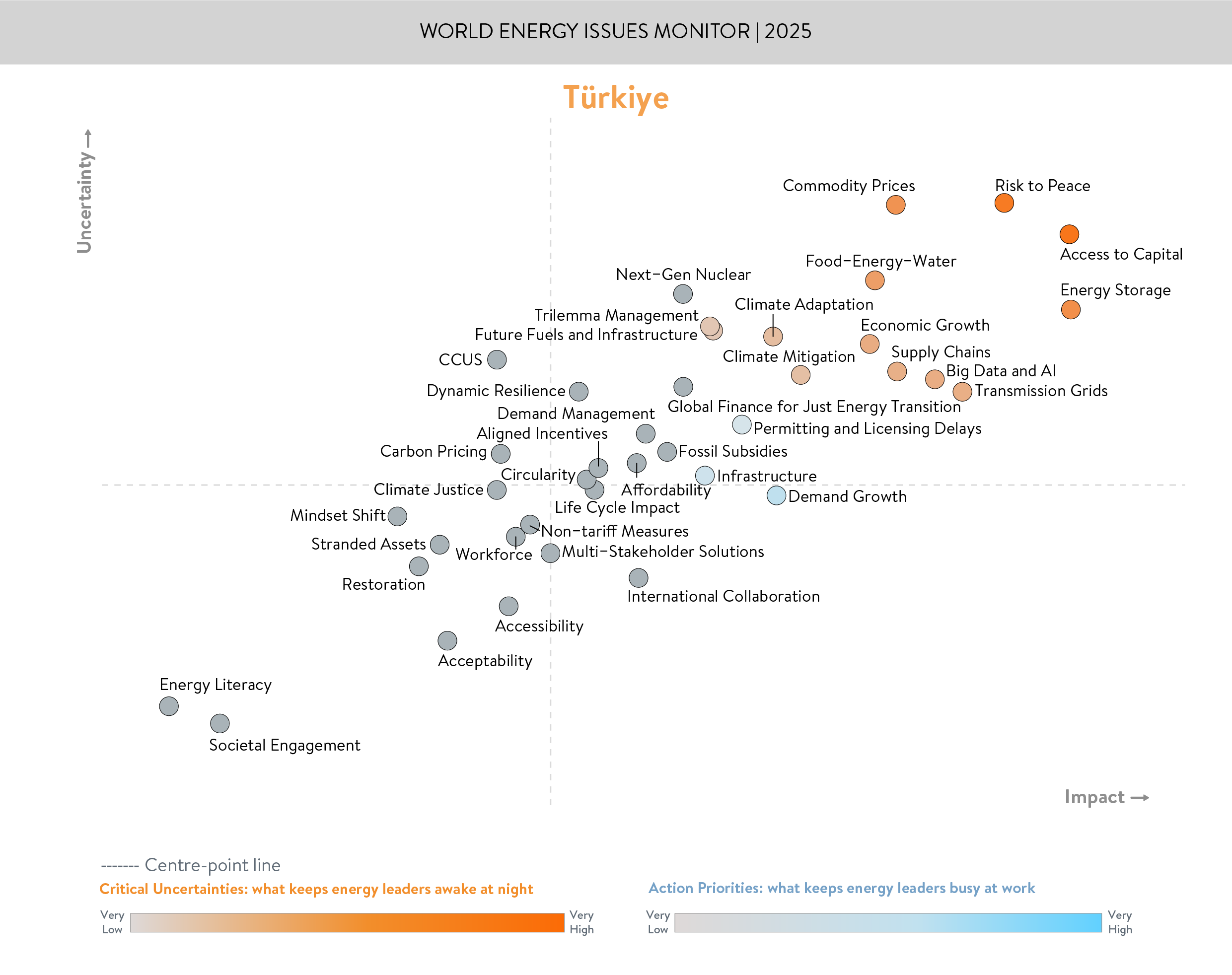
ENERGY ISSUES IN MOTION
Türkiye’s evolving energy landscape is shaped by a dynamic interplay of geopolitical factors, economic pressures, and sustainability goals. The country’s unique position as a bridge between Europe, Asia, and the Middle East further influences its energy policies and strategies. The increasing global emphasis on decarbonization, energy independence, and technological innovation presents both challenges and opportunities for Türkiye. The 2025 World Energy Issues Monitor for Türkiye highlights critical uncertainties and key action priorities that are shaping the country’s energy transition. Among these are energy security concerns stemming from geopolitical volatility, the need for greater investment in domestic energy resources, and the ongoing push for renewable energy expansion.
One of Türkiye’s top critical uncertainties is commodity price volatility, which may have an impact on economic stability. As a country reliant on energy imports, fluctuations in global oil and gas prices affect electricity costs and industrial production. Policymakers are exploring solutions such as long-term gas contracts, increasing domestic production, and investing in energy storage technologies to mitigate price shocks.
A major action priority in Türkiye is expanding and modernizing the electricity transmission grid. The growing share of renewables, particularly solar and wind, requires an advanced grid infrastructure to ensure reliability. Smart grids, digital monitoring, and automation are being introduced to improve efficiency and reduce transmission losses. Investment in energy storage solutions, such as battery storage and pumped hydro, is also essential to maintain grid stability in the face of variable renewable generation.
Additionally, Türkiye has ramped up its nuclear energy development as part of its strategy to enhance energy security and diversify its energy mix. The Akkuyu Nuclear Power Plant, set to become operational in phases, will significantly contribute to Türkiye’s electricity supply, reducing dependence on imported fossil fuels. Future investments in small modular reactors (SMRs) and additional nuclear plants are being considered to further strengthen energy independence.
Türkiye’s natural gas infrastructure is also undergoing significant expansion to meet growing demand. The Tuz Gölü and Silivri underground gas storage facilities are being upgraded to enhance supply security, particularly in times of geopolitical uncertainty. With Türkiye’s strategic position as a transit hub for natural gas, further investments in liquefied natural gas (LNG) terminals and interconnectors are improving flexibility in sourcing energy supplies.
FROM BLIND SPOTS TO BRIGHT SPOTS
One key blind spot in Türkiye’s energy landscape is oil and gas exploration studies, which hold significant future potential. While Türkiye has made substantial investments to reduce import dependence through renewable energy expansion, a large share of its oil and natural gas demand is still met through imports. Recent discoveries in the Black Sea, together with increasing onshore and off-shore exploration efforts, indicate meaningful progress and strong potential. Enhanced exploration activities in the Eastern Mediterranean and the Thrace region further contribute to strengthening Türkiye’s energy independence.
On the bright side, Türkiye has emerged as a leader in renewable energy development. The country ranks among the top producers of wind and solar power in the region, with ambitious targets for further growth. The YEKA (Renewable Energy Resource Areas) program has successfully attracted foreign and domestic investment in large-scale renewable projects. The expansion of distributed solar energy systems and incentives for rooftop solar installations are also enhancing energy access and affordability.
Türkiye is also making significant progress in energy efficiency policies, targeting reductions in industrial energy consumption and household energy waste. Programs such as Energy Performance Certificates (EPCs) for buildings, smart metering systems, and efficiency standards for industrial equipment are driving sustainability efforts. The country’s National Energy Efficiency Action Plan (NEEAP) aims to achieve substantial energy savings across multiple sectors.
ADDRESSING CRITICAL UNCERTAINTIES TO BALANCE THE WORLD ENERGY TRILEMMA
To ensure energy security, Türkiye must address the uncertainties surrounding geopolitical risks and supply chain disruptions. Its geographical position as a bridge between Europe, Asia, and the Middle East makes it vulnerable to regional conflicts that can impact energy imports and exports. Türkiye has responded by diversifying its energy supply sources, including developing LNG terminals, strengthening relations with alternative suppliers, and expanding pipeline infrastructure such as the Trans-Anatolian Natural Gas Pipeline (TANAP).
In terms of energy equity, Türkiye is prioritizing investments in infrastructure to ensure energy access for all regions, including remote and rural areas. The expansion of off-grid renewable energy solutions, mini-grids, and rural electrification projects is helping bridge the energy access gap. Additionally, energy efficiency measures and subsidy programs are being enhanced to make electricity and gas more affordable for low-income households.
For environmental sustainability, Türkiye is increasing its focus on climate adaptation and the circular economy. Sustainable urban planning, industrial recycling programs, and waste-to-energy initiatives are being implemented to reduce carbon emissions and promote resource efficiency. The country is also exploring carbon pricing mechanisms and emissions trading systems to encourage cleaner energy production.
Türkiye is investing in hydrogen and alternative fuels as part of its long-term energy transition strategy. Pilot projects on green hydrogen production are being explored to integrate hydrogen into industrial processes and transportation. The development of biofuels, synthetic fuels, and electric vehicle infrastructure will further support decarbonization efforts.
As the global energy landscape shifts towards decarbonization, Türkiye is also considering participation in regional carbon trading markets and aligning its policies with EU Green Deal regulations. The introduction of a national carbon pricing framework could encourage industries to adopt cleaner technologies and reduce emissions in line with international climate commitments.
In conclusion, Türkiye’s energy sector is undergoing a transformative shift driven by security, equity, and sustainability considerations. Türkiye is well-positioned to achieve a resilient and sustainable energy future. With continuous investment and innovation, Türkiye can further solidify its role as a key energy player in the region and beyond.
Acknowledgements
Turkey Member Committee
Downloads

Türkiye World Energy Issues Monitor 2025 Country Commentary
Download PDF